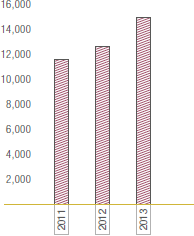The company has adopted the Indigenous Peoples Policy for eni’s operations in Australia and Norway.
In Norway, eni undertakes to conduct its operations respecting the rights, dignity, culture and the sources of subsistence and natural resources of the Sami population, to consult with them and to guarantee them an appropriate share in the benefits of the operations.
In Australia, eni’s operations are located onshore in the traditional Aboriginal territories and are regulated through a Land Use Agreement made with the Northern Land Council. eni is involved with the local Wadeye community through regular participation in meetings organized by a body representing 20 clans from the Region. Furthermore, relations with other key stakeholders, with regard to both industrial and social activities, are managed through frequent visits to the area organized by the Social Responsibility team, which includes a dedicated Community Liaison Officer.
The company has adopted the Indigenous Peoples Policy for eni’s operations in Australia and Norway.
Supply chain>
The commitment to protect human rights extends to the supply chain, in particular to the selection, qualification and monitoring of suppliers and their performance. In 2013, 87% of eni’s procurement comes from suppliers subjected to qualification procedures which include human rights screening.
In 2013, 87% of eni’s procurement comes from suppliers subjected to qualification procedures which include screenings on human rights.
In order to assess the conduct of suppliers specifically on areas of significance for human rights in the workplace, eni uses audits in accordance with the international standard SA8000.
In 2013, SA8000 audits were carried out on 14 suppliers / sub-suppliers in Congo, East Timor, Pakistan and Ecuador. Furthermore, 9 verification procedures were concluded after the SA8000 audits carried out in 2012 in Congo and Ecuador.
Suppliers subjected to qualification procedures including screenings on human rights
